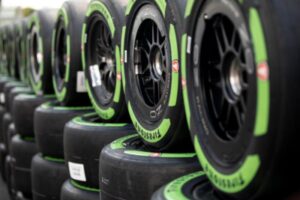Firestone Racing rolls out sustainable initiatives for 2023 Indycar season
Nashville, TN – Bridgestone Americas (Bridgestone) announced major strides have been made during the off-season to incorporate more sustainable and bio-circular materials into the 2023 NTT INDYCAR SERIES season, highlighting the advancement of three key initiatives that will make the upcoming season the most sustainable to date for America’s premier open-wheel racing series.
As the series’ exclusive tire supplier, Bridgestone will feature Firestone Firehawk race tires made with rubber derived from the guayule desert shrub as the alternate tire in all five street circuits of the 17-race season, a four-race bump from the season prior. Additionally, the majority of race tires used this season will be manufactured at the energy-efficient Advanced Test Production Center (ATPC), which has now received International Sustainability and Carbon Certification (ISCC) PLUS recognition for its transparency and traceability of sustainable raw materials. Finally, the company will utilize ISCC mass balance certified synthetic rubber1 made with recycled plastics in all its race tires for the 107th Running of the Indianapolis 500.
“We are driving sustainability in every area of our business, and we’re thrilled to be advancing guayule and other sustainable practices in America’s premier open-wheel racing series,” said Paolo Ferrari, CEO of Bridgestone Americas. “Firestone has a tremendous legacy of innovation and performance in racing, which we will continue to build upon as we move into this new era of cleaner, safer and more sustainable mobility on and off the track.”
The Firestone Firehawk race tire will be featured as the alternative tire at the Firestone Grand Prix (March 5) in St. Petersburg, Fla., Streets of Long Beach (April 16), Streets of Detroit (June 4), Streets of Toronto (July 16) and the Music City Grand Prix (Aug 6) in Nashville, Tenn. For the 2023 season, Bridgestone will supply more than 1900 tires using a sidewall material made exclusively with rubber derived from the guayule woody desert shrub grown on the company’s own farm in Eloy, Arizona. The initiative builds on the 2022 competitive debut of guayule race tires at the Big Machine Music City Grand Prix in Nashville last August
Bridgestone launched its guayule research initiative in 2012 when it broke ground on a guayule processing and research center in Mesa, Arizona. Today, the company continues to operate the Mesa facility in addition to a 281-acre guayule farm in Eloy, Arizona. To date, Bridgestone has invested more than $100 million in its efforts to commercialize guayule. Bridgestone is also the recipient of multiple U.S. government research grants for guayule research and development, including from the U.S. Department of Agriculture (July 2017 and November 2022) and from the U.S. Department of Energy Joint Genome Institute (September 2021).
In August 2022, Bridgestone announced its plans to invest an additional $42 million to establish commercial operations, with additional investment and expansion toward 2030. This investment will increase capacity of up to 25,000 additional acres of farmland for planting and harvesting guayule at scale in collaboration and partnership with local U.S. farmers and Native American tribes.
Guayule is part of Bridgestone’s plan to achieve carbon neutrality and make tires from 100% sustainable materials by 2050. The company is targeting commercial production of guayule-derived natural rubber by the end of the decade.
Bridgestone completes its farm to track sustainability initiative by manufacturing all Firestone Firehawk race tires at the newly ISCC PLUS certified ATPC in Akron. The certification was awarded to the facility on November 2, 2022 for its transparency and traceability of sustainable raw materials including bio, bio-circular and circular-based synthetic rubber1. The ATPC is the fourth Bridgestone facility in North America to be awarded the certification , behind the Aiken County Passenger/Light Truck Plant and Polymer Engineering Pilot Center in Akron. Sustainable practices in its manufacturing facilities are a critical element of Bridgestone’s sustainability commitments, including its aim to achieve carbon neutrality and tires made with 100% sustainable materials by 2050.
This year at the Indy 500, all race tires – for practice, qualifying and race– will incorporate ISCC recycled-attributed butadiene1, a monomer produced with recycled post-consumer plastic waste, to create the synthetic rubber in the tire1. The new monomer will replace the fossil-based monomer and will be supplied by Shell, the race series’ official fuel, oil and lubricant sponsor.
The acceleration of the company’s sustainable solution technologies for the 2023 INDYCAR season aligns with the Bridgestone E8 Commitment, which establishes eight values starting with the letter “E” to solidify Bridgestone’s commitment to a more sustainable world. Increasing the utilization of the Firestone Firehawk race tire with guayule, the ISCC PLUS certification and the new sustainable monomer are examples of the values “Emotion,” “Ecology” and “Energy.”

